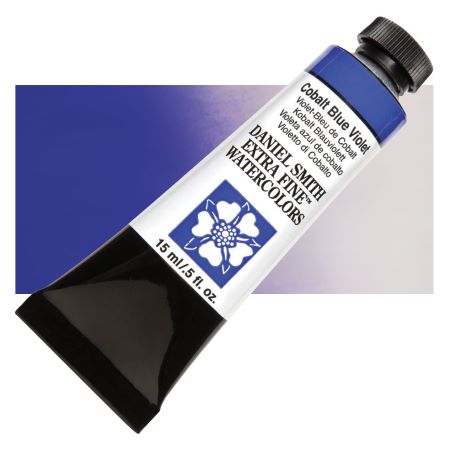Daniel Smith Extra Fine Watercolor - Cobalt Blue Violet, 15 ml Tube
Daniel Smith Extra Fine Watercolor - Cobalt Blue Violet, 15 ml Tube
ON SALE - 25% OFF.
Discount applied at checkout. We do not offer shipping.
3 in stock
Couldn't load pickup availability
Pigment Information
This color contains the following pigments:
PB28-Cobalt Blue
PV19-Quinacridone Violet
Pigment Name
PB28-Cobalt Blue
Pigment Type
inorganic
Chemical Name
Cobalt (II) oxide + aluminum oxide
Chemical Formula
CoO + Al2O3
Properties
Cobalt blue is a semitransparent pigment with low to moderate tinting strength. When it dries, it appears lighter and less saturated. Pigment particles are large and grainy. Differences in how the pigment is ground and mixed lead to considerable differences in its performance among various manufacturers.
Permanence
Cobalt blue is absolutely lightfast and extraordinarily stable. The stability of cobalt salts at high temperatures makes them the standard for blues used in ceramics and glassware.
Toxicity
Cobalt salts are toxic. Avoid respiratory and skin contact. Soluble cobalt may cause irritation and allergic reactions through contact with the skin. It is considered a possible carcinogen.
History
Since ancient times, smalt blue has been used to color glass and ceramics. Cobalt salts, which give smalt its characteristic blue color, were identified in the 18th century. Techniques for manufacturing Cobalt Blue, a chemically pure salt of cobalt and aluminum oxide, were developed in 1802.
Pigment Name
PV19-Quinacridone Violet
Pigment Type
organic synthetic, quinacridone
Chemical Formula
C20H12N2O2
Properties
Quinacridone Red is a high-performance, transparent pigment with an average drying time and uneven dispersal. It is another name for Quinacridone Violet (PV19) and Quinacridone Red (PR192). Quinacridone pigments have relatively low tinting strength in general. For this reason, quinacridone colors are often expensive, because more pigment is required in the formulation.
Permanence
Quinacridone Violet has excellent lightfastness and is considered the most lightfast organic pigment in this shade range.
Toxicity
Quinacridone Violet has no known acute hazards. Overexposure to quinacridone pigments may cause skin irritation. Quinicridone pigments contain a compound found to be a skin, eye, and respiratory irritant.
History
Although quinacridone compounds became known in the late 19th century, methods of manufacturing so as to make them practical for use as commercial pigments did not begin until the 1950s. Quinacridone pigments were first developed as coatings for the automotive industry, but were quickly adopted by artists.
DJ284600115
TU
1
Watercolors
0.06
DS W/C 15ML COBALT BLUE VIOLET
Share


